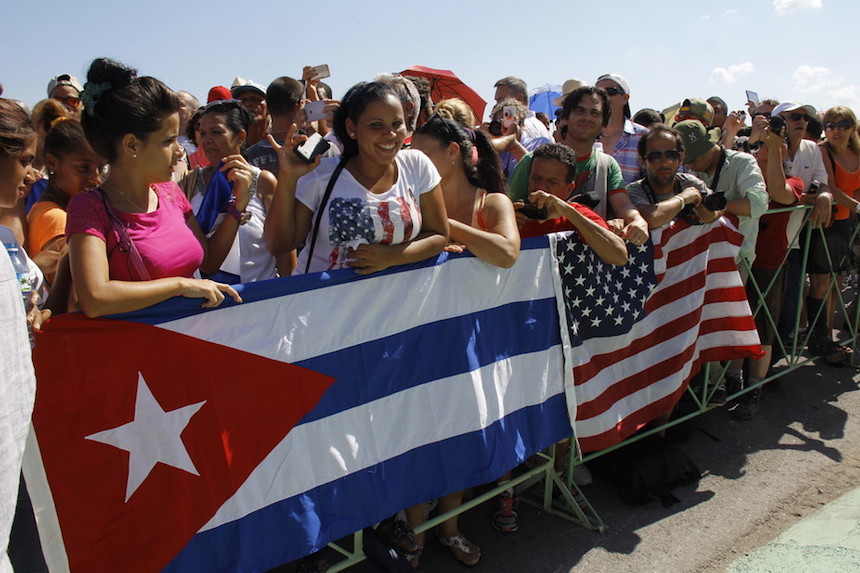
Donald Trump has issued a directive to tighten travel and business restrictions on Cuba. He is effectively reversing Barack Obama’s efforts to “normalize” relations with the island; at a rally in Miami, he said that “I am cancelling the last administration’s completely one-sided deal with Cuba.”
The directive isn’t quite that extreme: it leaves in place some of Barack Obama’s changes, including an open embassy in Havana. But contra Trump’s “America first” foreign policy mantra, his move will have ramifications well beyond the Florida Straits – and it will probably damage Washington’s influence in Latin America.
The US has maintained an economic embargo against Cuba since 1960. While the blockade was codified into law by Congress in 1996, when it comes to calibrating its implementation, the executive branch enjoys considerable leeway.
On that basis, this move smacks of hypocrisy and political expediency. In September 2015, Trump – who himself is alleged to have violated the embargo by attempting to do business in Cuba in the 1990s – said that “the concept of opening with Cuba is fine”. But by the end of the campaign, he was sounding a confrontational message. When Fidel Castro died shortly after the election, Trump tweeted that he would “terminate” the agreement struck in 2014.
His new directive makes it harder for Americans to travel to Cuba while restricting the ability of US firms to operate in the Cuban economy. That hardly serves the US’s aims. The Havana government’s pro-market reforms, though slow to take hold, have created new incentives for American businesses; US companies could lose more than US$6 billion in revenue over the next four years as a result of the tightened restrictions. The cruise and airline industries could shed thousands of jobs.
Meanwhile, a majority of Cuban-Americans now support engagement with Cuba, and national polls show growing support for an end to the embargo.
Nevertheless, with his legislative agenda otherwise stalled and his ban on travel from several majority-Muslim countries repeatedly blocked by the courts, Trump is desperate for accomplishments. As with his withdrawal from the Paris climate change agreement, Trump is playing to his base by rolling back Obama’s legacy wherever he can.
The move to strengthen the embargo will certainly be well-received in some conservative circles, as key Cuban-American powerbrokers continue to push for a policy of retribution. Marco Rubio, who sits on the Senate committee investigating Trump’s Russia ties, was the driving force behind the new rules, along with Republican Representative Mario Díaz-Balart.
Trump claims to want a “better deal” with Havana, but the Cuban government will not negotiate over issues of sovereignty. The emphasis on Cuba’s human rights record in Trump’s speech was particularly ironic given the notable absence of human rights concerns in his broader agenda. Though the decision was made with a domestic audience in mind, it will have ramifications throughout the Western hemisphere.
Losing influence
The Obama administration’s rapprochement with Havana was part of a wider attempt to grapple with the political realignment of the Americas more generally. In the 2000s, Latin America moved away from the US’s geopolitical orbit, as countries in Central and South America began challenging the US on a host of issues, from trade to the “War on Drugs”. Obama’s foreign policy was meant to shore up the US’s hegemony in its traditional “backyard”, and “normalizing” relations with Cuba was clearly a crucial step.
The embargo was, and is, vehemently opposed across Latin America, and Cuba’s contested status impeded multilateral diplomacy on a range of initiatives. Several countries threatened to quit the Summit of the Americas if Cuba wasn’t included. The island’s longstanding exclusion from the Organisation of American States fueled the creation of new institutions, such as the Community of Latin American and Caribbean States, which in turn undermined Washington’s influence. As Obama adviser Benjamin Rhodes said in spring 2015, the embargo was isolating the US rather than Cuba.
Combined with Trump’s anti-Mexico rhetoric, the tightened embargo signals a return to a more coercive policy toward Latin America. The risks that would carry are already becoming clear. Trump’s Cuba reversal coincided with a Central American security summit. Colombia reportedly responded to his Miami speech by threatening to pull out of the summit altogether, signaling that the Cuba about-face could create serious rifts with longstanding allies.
![]() This would be a terrible waste on all fronts. Better bilateral relations have allowed the US and Cuba to address matters of mutual concern, from drug trafficking to money laundering. Trump’s scorn for this pragmatic approach sends a clear message. His bullying might win the White House a news cycle and earn some kudos on the right, but it will damage Washington’s standing in a crucial region – one that’s already increasingly independent of the US’s power.
This would be a terrible waste on all fronts. Better bilateral relations have allowed the US and Cuba to address matters of mutual concern, from drug trafficking to money laundering. Trump’s scorn for this pragmatic approach sends a clear message. His bullying might win the White House a news cycle and earn some kudos on the right, but it will damage Washington’s standing in a crucial region – one that’s already increasingly independent of the US’s power.
Rubrick Biegon, Associate Lecturer, Politics and International Relations, University of Kent
This article was originally published on The Conversation. Read the original article.


